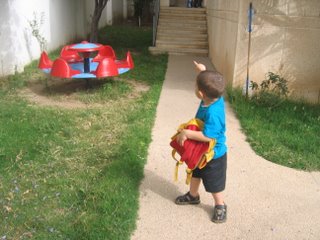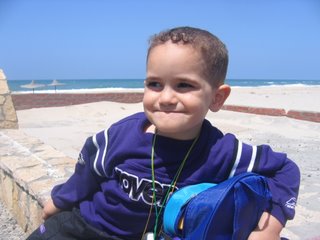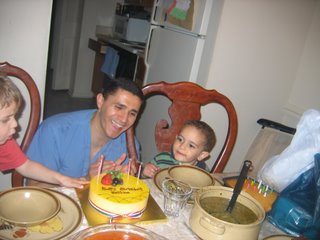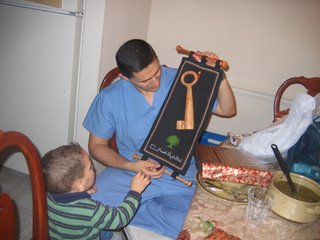What am I doing?
Well, for one-finding my way around "suburban hell", as my friend put it. Its been quite a long sretch of non-blogging for me and my fingers are starting to itch. but I'll make it up over the coming days I promise! between packing our things, getting ready to move down to North Carolina, finishing up some work and giving talks and interviews, and well, just having fun with my family and niece and nephew, I've had little time for anything else. we're currently staying with my brother in a suburb of Maryland meant for DC commuters known as "columbia".
It is a "planned community" meaning it was built from the ground up with family suburban living in mind-and the picture-perfection of it all can really get to you-everyone has a perfectly manicured lawn, two kids, and a dog; there is a park on every street, and the "town villages" are named things like "King's Contrivance", "Harper's Glen", and "Hickory Ridge"..you get the picture! You begin to feel like you are living in this bubble where everything is jolly good and the people are shiny and happy, to quote REM, and where nothing else matters in the world; to me, as comfortable as it is to slip into that zone, it is discomforting and uneasy.
Its also a very stark contrast to everything in Gaza of course (which I"ll get to in another post), as BBC's Dan Damon suggested to me in an interview last week; but one needn't go that far to see the divide-journey twenty minutes to downtown Baltimore and you'll get the picture: the contrasts in America itself between rich and poor are as vivid, if not more so, than perhaps anywhere else. In fact, according to the Census Bureau, some 13% of Americans are poor-in the richest country in the world. And of course Katrina gave us a taste of that. Mindboggling.
Luckily we won't be staying in Columbia much longer; in a few weeks we move down south to Durham, NC where Yassine will start his Opthalmology residency in Duke. In the meantime, Yousuf and I have been enjoying our re-union with Yassine, and with my brother and his two children. Here are some pictures from our journey out of Gaza into Suburbia, and in between.
 Yousuf says goodbye to his nursery in Gaza.
Yousuf says goodbye to his nursery in Gaza.
Yousuf takes his turn in line on the once-dreaded bus of Rafah Crossing. The journey was smooth and effortless (as effortless as an 8 hour journey across a dessert can be to access the closest usable airport). Only Palestinian ID card holders are allowed through Rafah to Gaza, and Israel still ulimately controls who goes in and out through a remote "control room" in Kerem Shalom. Many families who live abroad but whose spouses and children lack ID cards have been unable to unite in Gaza.

My father purchases peaches from a farmer in Sinai on our way to Cairo.

Yousuf is excited about the journey to Egypt

Taking a break on a beach-side fish restaurant in al-Arish, Egypt.

Enamoured, Yousuf kisses his cousin Sereen, who approvingly gives the "thumbs up".

Boys will be boys. Yousuf and his cousin Zade play with the dirt and later, eat tree leaves and scrape their knees.

Celebrating Yassine's 30th birthday

Yousuf gives baba his gift- a hand-carved olive wood "key to return", with names of villages burned in it.

Yassine and Yousuf choose their dinner during a night out on the town, in which Yousuf insisted on tagging along. To our (and the waiter's ) surprise, he ended up eating all the clams!

Yousuf hopes no one is watching as he stuffs his face with fresh-picked strawberries as a local farm.
At the farm, we met a palestinian family from Jerusalem; a Syrian woman; Sudanese; Jordanina; and Egyptian! The Palestinian woman is a Jerusalem resident who must renew her residency status every three years, and keeps addresss at her father's, in order not to lose her right to return to her homeland. Her husband, who is from Ramallah, and her kids, have to sneak across checkpoints through the mountains to join her in Jerusalem.

24 Comments:
Wow that is so nice.
I understand you have realtives in America.
If you were granted the opprutunity to live in America what is your say.
Great pictures! Travel safely.
Finally we see pictures of your husband!
Punishment of Palestinians will create a crucible of trouble for the world
George Bush's policies helped build Hamas; now a dangerous linkage with Iran and Iraq threatens a mega-crisis
By David Hirst
05/29/06 "The Guardian" -- -- Patients with chronic kidney disease dying for lack of their routine dialysis; 165,000 employees of the Palestine Authority unpaid for two and a half months; women selling jewellery for fuel or food ... the "humanitarian crisis" of the West Bank and Gaza is not a Darfur. And what most shocks Arabs and Muslims is that it stems from a conscious political decision by the world's only superpower. First, they say, you give us Iraq, now on the brink of civil war. Then this: the starving of a whole people.
The psychological and strategic linkage between Iraq and Palestine is far from new. But its latest, most intense phase began with the US invasion of Iraq - conceived by the Bush administration's pro-Israeli neoconservatives as the first great step in their region-wide scheme for "regime change" and "democratisation", whose consummation was to be an Arab-Israeli settlement. Indeed, professors Mearsheimer and Walt argue in their study, The Israel Lobby, that there very likely wouldn't have been an invasion at all but for Israel and, above all, its partisans inside the US.
But it had always been crystal clear that the more authentic any democracy Arabs or Palestinians did come to enjoy, US-inspired or not, the more their conception of a settlement would collide with the US-Israeli one. The point was swiftly proved, in the wake of Hamas's assumption of power, when President Bush declared: "We support democracy, but that doesn't mean we have to support governments elected as a result of democracy." And his administration set about engineering Palestinian "regime change" in reverse.
Its strategy found more or less willing accomplices - Europeans, Arab governments, the Palestinians themselves. But it was always going to be a perilous one; the more vigorously it was pursued in the face of the opposition that it was bound to encounter, the more likely it was to make of Palestine a crucible of trouble for its own people, the region and the world - very much like the one that other quasi-colonial western intervention had already made of Iraq.
The idea was to get the Palestinians, through collective punishment, to repudiate the very people they had just elected. Some do blame Hamas. But most of those blame America much more. If anything, sanctions have had the opposite effect from that intended, encouraging people to rally round the new government. Buoyed by its own popularity, on top of its electoral legitimacy, Hamas won't easily relinquish power - "not without a war", said Iyyad Sarraj, a Gaza psychologist.
Even if the US did succeed in bringing Hamas down, it would, like the overthrow of Saddam, be a catastrophic kind of success - plunging Palestine, too, into the chaos and internecine strife that is the antithesis of the modern, democratic, pro-western Middle East order the US is trying to build. It is clear that, with President Mahmoud Abbas's bombshell proposal for a referendum on the nature of a final peace raising the political stakes and with skirmishes in Gaza raising the military ones, war between Hamas and Fatah is eminently possible. It is far from clear that America's "side" could win. "If Fatah couldn't fight Hamas while it was still in power," said General Ilan Paz, the former head of Israel's civil administration in the territories, "how could it gain control with Hamas in power and itself disintegrated?"
Furthermore, chaos in the territories would open the way to militants, jihadists and suicide bombers from the rest of the world, just as it did in Iraq. Iran, the non-Arab country that is now the main state patron of Arab radicalism, was quicker than any Arab government to offer money to the new Hamas regime. An intrinsic part of its wider strategic and nuclear ambitions, Palestine now ranks among Iran's top foreign-policy priorities. Abbas says that Hizbullah and al-Qaida are already active in Gaza. From where, if not from such outsiders, have come the long-range Katyusha missiles that have begun to target southern Israel from Gaza? And if Hamas were driven from office, it would go underground again, resuming with a vengeance the resistance it has suspended.
As for the Arabs, they would be at least as subject to the fallout from Palestine as they are from Iraq's. Their discredited regimes hardly know what to fear more: the example of a Hamas democratically installed or undemocratically ousted. The first would encourage the ascension of their own Islamists. The civil war liable to result from the second would arouse even more dangerous passions among them. Broadly speaking, Hamas has Arab, especially Islamist, public opinion on its side, and the more the regimes defer to the US in its anti-Hamas campaign, the greater discredit they will fall into.
For Rami Khouri, a leading Beirut columnist, the Palestine cause risks being transformed from a "national" into a "civilisational" one, with "potentially dangerous linkages between events in Palestine-Israel and the rest of the Middle East".
"Hundreds of thousands of young people will feel duped and betrayed. The wellspring of support for Hamas- and Muslim Brotherhood-style democratic engagement will slowly dry up in favour of more intense armed struggle. They will stop wasting time trying to redress grievances through peaceful, democratic politics or diplomacy ... Bringing down the Hamas-led Palestinian government will bring further radicalisation, resistance and terrorism across the region." Well aware of this resonance, the Palestinian finance minister, Omar Abdul Razeq, warned: "The entire region will catch fire if the Palestinian people are pushed to a situation where they have nothing to lose."
Suddenly this month the Bush administration seemed to grasp something of the perils it is courting. And those US-engineered privations of Gaza were too scandalous to ignore. At a meeting of the Quartet (the EU, the US, the UN and Russia), it offered $10m in emergency medical aid. The largesse was paltry and grudging, but at least it seemed to indicate that Washington had given up hope of bringing about immediate "regime change" via economic ruin. Gideon Levy, a pro-Palestinian Israeli commentator, was even moved to say: "Hamas is winning."
Hardly. For the only substantive way in which it could be said to be doing that would be if the US started drawing the right conclusions from this spectacularly unwelcome result of Arab democratisation - the most important of which is that, were it not for US policies, Hamas would never have won the elections.
But that would require a fundamental, revolutionary change of heart. In the opinion of Mearsheimer and Walt, the extraordinary US attachment to Israel - that moral and strategic "burden" - makes such a change impossible any time soon. So the fear must now be that, long before this could happen, the Middle East's "dangerous linkages" will assert themselves even more dangerously than before, and that those two ongoing crises - Palestine and Iraq, which the attachment did so much to engender - will be joined, and fused into a single mega-crisis, by a third: when, on its protege's behalf, the Bush administration goes to war against Iran.
· David Hirst reported from the Middle East for the Guardian from 1963 to 2001- dhirst@beirut.com
Click on "comments" below to read or post comments - Click Here For Comment Policy
Comment (0) | Trackback (0)
Are Comments Offensive? Unsuitable? Email us
In accordance with Title 17 U.S.C. Section 107, this material is distributed without profit to those who have expressed a prior interest in receiving the included information for research and educational purposes. Information Clearing House has no affiliation whatsoever with the originator of this article nor is Information ClearingHouse endorsed or sponsored by the originator.)
Join our Daily News Headlines Email Digest
Fill out your emailaddress
to receive our newsletter!
SubscribeUnsubscribe
Powered by YourMailinglistProvider.com
HOME
COPYRIGHT NOTICE
hello and I am glad you made it here safe.
As for the anonymous claiming you have to make a choice and that life is about choices, NOT EVERYONE HAS A U.S.A. PASSPORT. As a palestinian, I know many borders are closed (my own at the top of the list) to me even if I choose to go there, for instance in 2000 I had to pull out my white passport to see my home land and the holy land.
I just wish you the best of luck Laila (Um Yousuf) I just started to read your blogs two days ago and boy do we have a lot in common. Since you are a journalist, I don't believe you have to make a choice :)
Um Younis, 27, from gaza strip (told you we have a lot in common) lived in the U.S.A. for the past 15 years
Good to see you reunited with the hubby. I live pretty close to you in the States, in the DC area; actually know people in Columbia MD. Enjoy your time.
Welcome to the DC area where I live. We are glad to have you in the area. Insha'Allah, your stay is wonderful.
Anonymous said:".........I am not trying to taunt you............"I wonder how do you, Laila, respond to the statement about "choices" for you,for your son, for your family, for your people, for peace, for Hamas, for the israeli children, for the Israelis families, for the israeli people....it all starts personally, then family...............What is the first step?
ASA: welcome to the DC merto area. My parents live in old Laruel about 15 mins from Columbia and my husband and I go to Columbia mall to enjoy a night at the movies. You should like it.. there is plenty to do and the community is diverse which is good for the children. Other parts of Metro area can be really segregated which is unfortunate.
I hope you enjoy your stay and come back often to visit inshaAllah.
Sherifah
I'm glad you have been reunited with yur husband leila. Yousuf seems to be enjoying himself with his cousins and especially the strawberries! I hope all is well for you and your family.
Anonymous said...
Anonymous said:".........I am not trying to taunt you"
so why are you taunting her with asking the same stupid question over and over hymie?
could it be that you hope that she stays in USA and one less Palestinian to worry about?
consider if all the Palestinians move to USA there will be more arabs in USA than chosenites....
which means the end to you kosher welfare and AIPAC control of congress etc...
be careful of what you wish for schlomo :)
Great to hear you made it to the States!
Brian Avery I think lives in North Carolina.
The amazing courageous ISM volunteer who had his face shot nearly off by the
Israeli occupation forces in 2003
Hey! El7amdellah 3ala esalameh!
Could you sleep there without shelling ;)
I think you could recorded the noise of shelling before going to sleep while listining to it :)
"Chosenites" ?!!
Never heard that one before.
Sheesh.
anonymous was referring to the opportunity to live in peace and not to offend Laila the way you have tried to do on your posted 3:59 am response.
I talked about CHOICES for everybody: Israelis and Palestinians............and who will be brave enough to take the FIRST STEP.................
Hey, I really miss your posts. Please keep on writing, even from Durham!
* I hope I am not posting this twice.
It is interesting that you point out the poverty statistics in the USA.
The Economist, December 20, 2005, had an article, "The Mountain Man and The Surgeon", discussing the relativity of poverty between rich and poor countries. The article examined the lives of a poor man in the USA and a fairly well-off man in a poor country. Here are some excerpts from the article. (Due to copyright, I will not copy the entire article.)
"Why juxtapose the lives of a poor man in a rich country and a relatively well-off man in a poor one? The exercise is useful for two reasons. First, it puts the rich world's wealth into context. A Congolese doctor, a man most other Congolese would consider wealthy, is worse off materially than most poor people in America. That, in itself, is striking."
"“Poverty” describes two quite different phenomena: utter penury, of the sort experienced by the billion or so souls who subsist on $1 a day or less; and the situation of people in rich countries who are less well off than their compatriots."
"For the first group, finding enough to eat is a daily struggle, and a $2-a-day job hand-washing mineral ore in a river is a lucky break. Shortly before meeting Dr Kabamba, your correspondent interviewed a group of Congolese ore-washers who were delighted to have found such lucrative work."
"European countries tend to use relative measures of poverty. A household with an income less than 50% or 60% of the national median counts as poor. This has the perverse result that if the country gets richer, the poverty rate can still rise, as long as incomes at the top and in the middle rise faster than those at the bottom."
"America, more sensibly, uses an absolute standard. The “poverty threshold”, created in the mid-1960s, was based on an estimate of how much an adequate diet might cost, multiplied by three. This figure is adjusted for inflation each year, but is otherwise unchanged. So the fact that, according to the Census Bureau, the share of Americans in poverty rose between 1974 and 2004, from 11.2% to 12.7%, ought to be a cause for shame."
"But it is not, because American poverty statistics are misleading. For one thing, the poor rarely stay that way. In 1996-99, only 2% of Americans were poor every month over the full four-year period. And life appears, by most measures, to have improved. Poor people today live longer, spend longer in education and are more likely to have jobs. Fewer live in substandard houses, more have cars, fridges, boomboxes and other necessities that were luxuries a couple of generations ago."
"But here are two concluding observations. First, if poor Americans were to compare their standard of living with what is normal elsewhere in the world, let alone in Congo, they would see they have little cause for discontent. Then again, were Americans not so incurably discontented with their lot, their great country would not be half as dynamic as it is."
laila--
always enjoy your blog...
but as someone who grew up in Columbia, i have to disagree with your take on it, and invite you to take a deeper look at the place.
first of all, i am a New Yorker by birth, and no fan of suburbia. but Columbia has a very interesting history and began with a rather noble mission... an experiment in racial and economic integration.
take any typical street scene in Columbia. sure, those boring townhouses look just like the ones across the street. but did you know that the ones on the left are actually low-income housing projects? Columbia managed - in a way that i've never seen in any other suburb - to create virtually seamless living for race and class. Couple that with the largest concentration of Black middle class in the US, and it made for a very interesting multicultural place to grow up.
look at some of the people who've emerged from Columbia, and you'll understand that its kind of a special place. Aaron McGRuder, who started the iconiclastic "Boondocks" comic strip. Suzanne Malveaux, the CNN white house correspondant...
Of course, the original vision of Columbia became subverted by its very success in the 1980s under the Reagan "boom." Much of the original character of the place has been erased. But knowing the kind of place it was, I had to speak up.. because Columbia in many ways was a suburban anti-suburb; and I am sure a lot of that spirit is still there.
Sure doesn't make up for the race/class inequities in B-More or D.C., but it tried in its own little way.
Dan Charnas
Hi Dan,
i have to agree with you that it is much more diverse than other communites (i realized after spending more time in the playgrounds!), although having lived in Boston for many years, the difference is palpable. I guess that is what I am comparing it to. albeit boston is a city. In boston we also lived in a housing project of sorts that convereted a poor and run-down neighbourhood to a mixed income living compound (the project din't work in practice as well as in theory, because while it is a very diverse community-it is still fairly self-segrated, though it is has received man international awards). But yeah I can see how the original vision of columbia was noble. After all there is nothing wrong with wanting to plan a community for families to live in safely and peacefully, its just me being caustic :) I guess I am also used to less "cookie-cutter" which is what columbia seems like these days with all the new housing developments and more eclectic communites. but that is it interesting how you put it-suburburbun anti-suburb. you got me intersted, I'm going ot reseach this a little more now :)
p.s. add to your list of high-profile celebs who grew up her Edward Norton (as i would learn reading this month's "baltimore magazine" while sitting in the Dentists office today!). Apparently his grandparents were some of the founders or something.
Laila,
Could you please inform us where I can find your article on food? I am writing a chapter for my dissertation on food and I would love to hear (read) your point of view!
After living in Ireland for several years it was a bit difficult coming back to the US. The cars, houses etc. show a country of incredible wealth. I can only imagine how it must seem coming from Gaza.
I wish you and Yousuf the best on your time in the US and being reunited with Yassine.
Welcome to Durham,North Carolina. I am back in Nebraska now and have been for a few years. I just came back from North Carolina where I went to my grandson's High School graduation. I wish you and your family a great stay there. I am sure you will like it and find life somewhat different there.
To Heba from Gaza ... do you have an e-mail address?
Laila ... I wish you and your family a GREAT time!! How long will you guys remain there?
Dana,
Hebafromgaza gave us a link to the food article: http://www.thisweekinpalestine.com/details.php?id=1726&ed=115
Thanks Heba
Post a Comment
<< Home